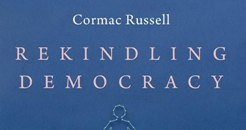 Rekindling Democracy
Rekindling Democracy
From the book 'Rekindling Democracy' by Cormac Russell
Cormac Russell in his book, 'Rekindling Democracy, A Professional’s Guide To Working In Citizen Space', argues that industrialized countries are suffering through a democratic inversion; where the doctor is assumed to be the primary producer of health; the teacher of education; the police officer of safety, and the politician of democracy.
Through a blend of storytelling, research and original ideas, Cormac asserts instead that in a functioning democracy, the role of the professionals ought to be defined as that which happens after the important work of citizens is done. The primary role of the 21st century practitioner therefore is not a deliverer of top-down services, but a precipitator of more active citizenship and community building. And then he goes about showing us how to do so effectively.
Here is an excerpt:
Democracy redefined: shifting from institution centred to citizens centred
In a democracy, effective central and local governments and not for profit institutions, function as an extension of civic life and serve to protect it. When institutions begin to replace civic life, doing things to or for citizens they can do themselves or with each other, a shift from democratic to a technocratic way of life takes hold.
Technocratic governing regulates citizens to second place; it turns them into clients and consumers of government services and positions experts and officials as superior to the people they serve. Over time, five unintended consequences of this arrangement become evident:
-
People who need support due to economic isolation or fragility become defined as problems to be fixed, not as people to be valued and connected, people who possess the assets and resources that are critical to addressing their challenges.
-
A significant portion of the money intended to support those who are economically marginalised, goes to paid service providers, not to economically marginalised people themselves.
-
Active citizenship begins to retreat in the face of ever-growing professionalism and expertise. People not credentialed by a professional 'guild' become increasingly more dependent on institutional services to do what previously was done by participating in community life.
-
Economically marginalised communities begin to internalise a map - a map drawn by outside experts - that defines them as helpless people populating hopeless places. Not surprisingly, the people who live in these communities that have been defined by others as backwaters of pain and suffering, come to believe that things will only get better only when someone with the right resources and expertise comes in from outside to make them better.
-
Citizens begin to believe that a good life is not to be found in interdependent relationships, at the centre of community life, alongside near neighbours, but in services and programmes at the edge of their communities provided by salaried strangers. Many of those who are surrounded by a wide range of such services been exiled from community life into 'service land', the environment within which services and programmes dominate. They are no longer known as a sister, brother, son, daughter, friend or neighbour. They have been redefined as a service user, a patient, someone endlessly waiting to be fixed. The many services coalesce to form a new environment around the person that transposes their role from citizen to client.
In most parts of the world, these consequences are combining to erode the social and political foundation of everyday life. This adds up to a creeping crisis that may be thought of as a rip in the social fabric of our collective lives, evident in any ever-increasing disconnection and loneliness.
In Canada, for example, one in four people is estimated to be lonely. A study by researchers at Brigham Young University found the ill effects of loneliness are as bad as smoking 15 cigarettes a day. The study looked at more than 3 million participants are found increased social connection is linked to a 50% reduced risk of premature death. The United Kingdom is so concerned about the issue they appointed a minister for loneliness to tackle social isolation in 2018. Throughout Europe, North America and Australia more than 20% of the people consulting their doctors are not biomedically ill - they are lonely.
What is the solution - community!
If we want to address loneliness, the evidence is clear on what not to do, treat loneliness as yet another condition. People living with loneliness do not want to be associated with a stigmatising term - 'loneliness'. To address loneliness and other symptoms of the unravelling of our social fabric, we must reconnect people to the reciprocal relationships based on their capabilities, not their deficits or labels.
Julia Unwin, DBE, former chief executive of the Joseph Rowntree Foundation, comments, "This book is a manifesto for a different sort of society and a more relational, more human way of doing business. Drawing on personal experience that is both deep and broad, Cormac maps out the opportunities facing communities and offers a careful and compelling understanding of the shortcomings of some of the institutions and systems created to respond to 'social need'. It offers a route map for our increasingly uncertain future, based on deep knowledge, practical experience, and a profound commitment to the common good."
See more here.
Retweet about this article:
From book 'Rekindling Democracy' Cormac Russell, 14/06/2022